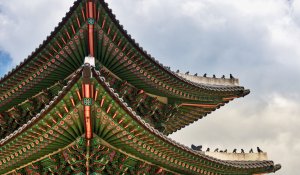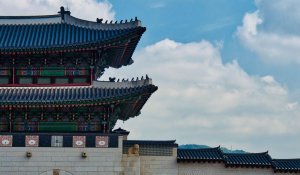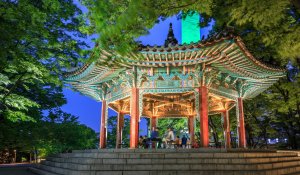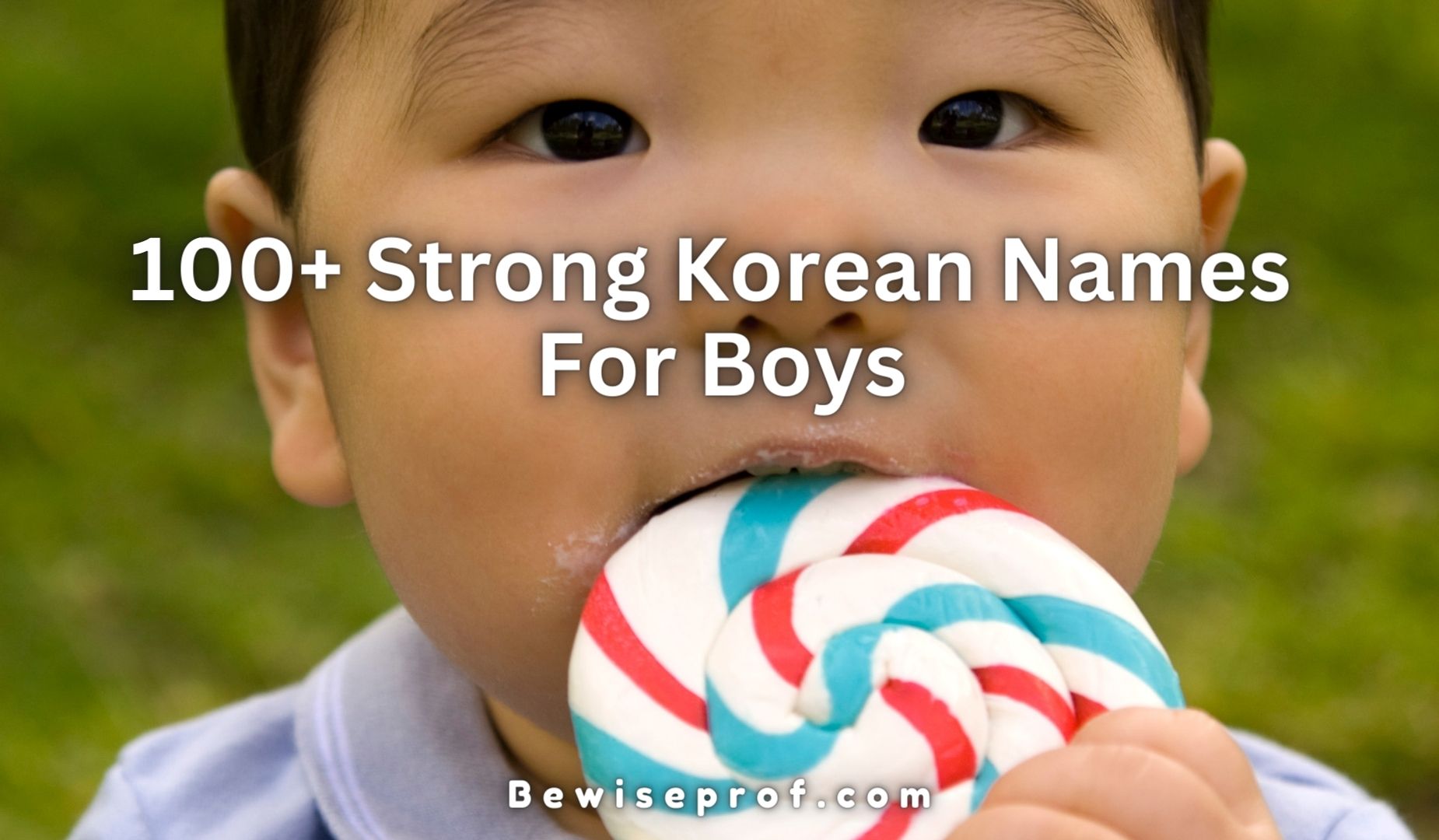In the old days, Koreans chose baby names based on the Chinese zodiac. This system connects dates, times, and birth years to elements like earth, water, wood, metal, or fire.
These elements were thought to shape the baby’s future. Names called hanja were selected to avoid bad luck. So, the baby’s birth time was very important for choosing the name.
Usually, the baby’s grandfather or a professional name chooser would pick the name. Even though this tradition is fading, many Korean parents still ask experts for help.
However, things are changing. Now, more people are choosing native Korean names instead of hanja. They are moving away from the old method of using experts for naming.

List Of Korean Boy Names and Meanings
These Korean boy names offer options for every family, whether they prefer traditional, contemporary, or strong Korean-American names.
- Baek-Hyun (백현)
- Meaning: Baek means “white,” and Hyun can mean “shining,” “clever,” or “strong.”
- Bitgaram (빛가람)
- Meaning: Bitgaram translates to “shining river.”
- Byung-ho (병호)
- Meaning: Byung-ho means “stunningly brilliant,” “bright,” or “vast.”
- Chan-yeol (찬열)
- Meaning: Chan-yeol refers to being “bright,” “vibrant,” “fiery,” and “passionate.”
- Dae-Hyun (대현)
- Meaning: Dae-hyun signifies something “big,” “fantastic,” or “sparkling.”
- Dae-jung (대정)
- Meaning: Dae-jung can mean “great,” “high,” or “middle.”
- Dae-Seong (대성)
- Meaning: Dae-Seong combines meanings like “enormous,” “huge,” “high,” and “awe-inspiring.”
- Dal (달)
- Meaning: Dal simply means “moon” in Korean.
- Dong-geun (동근)
- Meaning: Dong-geun is derived from hanja meaning “east” and “foundation.”
- Do-Yun (도윤)
- Meaning: Do-yun refers to a “path,” “roadway,” or “road.”
- Duri (두리)
- Meaning: Duri means “two” in the Gyeongsang dialect.
- Eun (은)
- Meaning: Eun has various hanja meanings related to “love,” “kindness,” “flourishing,” or “abundance.”
- Ga-Eul (가을)
- Meaning: Ga-Eul means “autumn” or “fall” in Korean.
- Ga-ram (가람)
- Meaning: Ga-ram translates to “river” in Korean.
- Ha-da (하다)
- Meaning: Ha-da is derived from the verb “hada,” meaning “to do” or “to act.”
- Haneul (하늘)
- Meaning: Haneul means “heaven” or “sky” in Korean.
- Han-wool (한울)
- Meaning: Han-wool is synonymous with “heaven” in Korean.
- Ha-ru (하루)
- Meaning: Ha-ru simply means “day” in Korean.
- Him-chan (힘찬)
Him-chan means “strong.” - Ho (호)
There are 47 Hanja characters for Ho, with meanings like “tiger,” “abundant,” or “heroic.” - Ho-Seok (호석)
Ho-Seok combines meanings like “tiger,” “heroic,” or “plentiful” with elements like “stone” or “tin.” - Hwan (환)
Hwan can mean “happiness,” “glow,” or “ability to shine.” It’s often part of two-syllable names or surnames in Korea. - Hye (혜)
Hye is typically written with Hanja characters meaning “wisdom.” King Hye of Baekje was a historical ruler in Korea during the 6th century. - Hyun (현)
There are 42 Hanja characters for Hyun, with meanings like “good,” “moral,” or “shining.” Science-fiction writer Joh Hyun is known for his imaginative works, including novels about cyborgs. - Hyun-jung (현정)
Hyun-jung combines 42 Hanja characters for “Hyun” and 84 for “Jung,” offering numerous meanings. South Korean football coach Yang Hyun-Jung was also a former player before injuries ended his career. - Hyun-woo (현우)
Hyun-woo can mean “prominent display,” “defender,” or “evaluator.” It’s a popular name for boys in Korea, reflecting various positive attributes. - Il-sung (일성)
Il-sung combines elements meaning “sun,” “day,” and “accomplishment.” Kim Il-sung was the founder and leader of North Korea until his death in 1994. - Iseul (이슬)
Iseul means “dew” in Korean. It’s a gender-neutral name gaining popularity in recent years. - Jae (재)
Jae can mean “talent,” “wealth,” or “ability.” Korean-American singer Park Jae Hyung, known as Jae, gained fame through K-Pop Star and later joined Day6. - Jae-sung (재성)
Jae-sung can mean “to exist,” “to rule,” or “to achieve,” combined with attributes like “honest” and “sincere.” Boxer Lee Jae-sung is a champion in the featherweight division in South Korea. - Jeong-ho (정호)
Jeong-ho can be written in various ways, combining meanings like “tablet” and “like.” Kim Jeong-ho was famous for creating the largest map of Korea in the 19th century. - Jeong-hui (정희)
Jeong-hui combines meanings like “correct,” “quiet,” or “peaceful” with elements like “beauty” and “brightness.” Gim Jeong-hui was a renowned scholar and calligrapher during the Joseon Dynasty. - Jeong-hun (정훈)
Jeong-hun blends meanings like “correct,” “morality,” and “prestigious deed.” Actor Yeon Jeong-hun is known for hosting Top Gear Korea and his roles in Korean dramas. - Ji (지)
Ji is a gender-neutral name that can stand alone or be part of a surname. It’s associated with meanings like “wisdom” and “pond” in Hanja characters. - Ji-hu (지후)
Ji-hu refers to “wisdom,” “intellect,” or “richness.” It was a popular name for boys in 2009 in Korea. - Ji-hun (지훈)
Ji-hun combines meanings like “intelligence,” “wisdom,” and “ambition,” with attributes like “outstanding deed.” Cho Chi-hun, a poet and activist, was a prominent figure in Korean literature. - Ji-min (지민)
Ji-min combines meanings like “ambition,” “wisdom,” and attributes like “sharp” or “clever.” Park Ji-min, known as Jimin, is a member of BTS and a popular idol worldwide. - Ji-su (지수)
Ji-su refers to “wisdom” or “exquisite beauty.” It’s a short and lively name that’s becoming more popular in Korea.

39. Ji-won (jiweon)
Ji-won can mean sesame, earth stop, the first, primary, or beauty.
40. Ji-woo (jiu)
Ji-woo is officially transcribed as Ji-u, but most people prefer the spelling Ji-woo. The name can mean ambition, universe, or protection.
41. Jong-dae (jeongdae)
Jong-dae can refer to bells or clocks. It can also mean big, enormous, or huge.
42. Jong-in (jeongin)
Jong-in can mean quiet, gentle, chaste, kindness, or generosity.
43. Jong-soo (jeongsu)
Jong refers to lineage, ancestry, or gentleness. Soo means beautiful, exceptional, luxurious, or elegant.
44. Jun (jun)
Jun can mean talented, obey, deep, army, or obedience.
45. Jung (jeong)
Jung can mean quiet, gentle, still, virtuous, honest, or chaste. It could have other meanings depending on the hanja used.
46. Jung-hee (jeonghyi)
Jung-hee can mean right, calm, steady, gentle, beautiful, brilliant, or glorious.
47. Jung-ho (jeongho)
Jung-ho can mean correct, appropriate, huge, or wonderful.
48. Jung-kook (jeonggug)
Jung-kook incorporates meanings such as king, ruler, nation, state, or country.
49. Jun-ho (junho)
Jun-ho can mean handsome, king, army, or famous.
50. Jun-myeon (junmyeon)
Jun can mean handsome, king, or army. Myeon can mean famous, obscure, sea, or various other meanings.
51. Jun-seo (junseo)
Jun-seo can have many interpretations due to the variety of hanja used. Typically, Jun means talented or handsome, and Seo can mean auspicious or accomplished.
52. Ju-won (juweon)
Ju-won can mean circumference, place of origin, or beautiful woman.
53. Kyung (gyeong)
Kyung can mean views, scenery, capital, respect, or various other meanings.
54. Kyung-soo (gyeongsu)
Kyung can mean respect, scenery, or capital. Soo can mean excellence, longevity, or protection.
55. Min (min)
Min can mean jade, heaven, or a trickling stream of water.

56. Min-jun (민준) Meaning: Sharp, clever, friendly, attractive, talented.
57. Min-seok (민석) Meaning: Jade-like stone, confer, bestow.
58. Min-su (민수) Meaning: People, citizens; gentle, elegant; stunning, beautiful, exceptional.
59. Mi-reu (미르) Meaning: Dragons.
60. Myeong (명) Meaning: Brilliance, bright.
61. Nam-gil (남길) Meaning: My way.
62. Nam-joon (남준) Meaning: Man, south; ruler, king.
63. Na-moo (나무) Meaning: Wood, tree, firewood.
64. Na-ra (나라) Meaning: Kingdom, country, nation.
65. Noo-ri (누리) Meaning: Hail.
66. Pu-reum (푸름) Meaning: Blue.
67. Saem (샘) Meaning: Fountain, spring.

68. Sang (상) Meaning: Frost, auspicious, elephant.
69. Sang-hun (상훈) Meaning: Nonetheless; honorable, prestigious deed.
70. Se-hun (세훈) Meaning: Era, world generation; mysterious act.
71. Seo-jun (서준) Meaning: Auspicious, comfortable, open; beautiful, gifted.
72. Seok (석) Meaning: Seats, eminent, interpret; stone, eminent.
73. Seok-jin (석진) Meaning: Stone, tin; time, treasure, season; safeguard.
74. Seong (성) Meaning: Star, holy; victory, library.
75. Seong-ho (성호) Meaning: Finished, abundant; stove, daybreak.
76. Seong-hun (성훈) Meaning: Achievement, becoming distinguished in service.
77. Seong-jin (성진) Meaning: Star, completed; planet, complete; town, market, shake, excitement.
78. Seong-min (성민) Meaning: Nature, finished; sexual, fast, sharp, clever.
79. Seong-su (성수) Meaning: Holy, sacred; shore, water, bank.
80. Seul-ki (슬기) Meaning: Wisdom.
81. Seung (승) Meaning: Ascent, victory; inherit.

82. Si-u (시우) Meaning: Beginning, divine intervention.
83. Sol (솔) Meaning: Pine.
84. Su-bin (수빈) Meaning: Luxuriant elegance, gorgeous, refined.
85. Su-jin (수진) Meaning: Gather, harvest; precious, uncommon.
86. Sung-hyun (성현) Meaning: Finished, successful; able, virtuous, decent, worthy.
87. Tae (태) Meaning: Dangerous, exalted; flog, be trampled; wash, blowfish.
88. Tae-hyun (태현) Meaning: Large, high; best, good; moral, current.
89. Tae-hyung (태형) Meaning: Dangerous, to be trampled; wash; good, worthy, virtuous.
90. U-jin (우진) Meaning: House, universe; protection.
91. U-ram (우람) Meaning: Vigorous, robust, imposing, stately.
92. U-ri (우리) Meaning: We.
93. Ye-jun (예준) Meaning: Craft, talent; art; beautiful, handsome, talented.
94. Yeong (영) Meaning: Forever, flourishing; reflection, shadow.
95. Yeong-cheol (영철) Meaning: Perpetual, eternal; wise, sage.
96. Yeong-gi (영기) Meaning: Glory, honor, success; rise, stand tall.
97. Yeong-ho (영호) Meaning: Flower petals, brave, hero; multitude, distinct.
98. Yeong-su (영수) Meaning: Eternal, continuous; longevity.
99. Yong (용) Meaning: Dragon.
100. Yoon-gi (윤기) Meaning: Gloss, shining.
101. Yun-seo (윤서) Meaning: Regulate, consent, allow; sequence, series.
